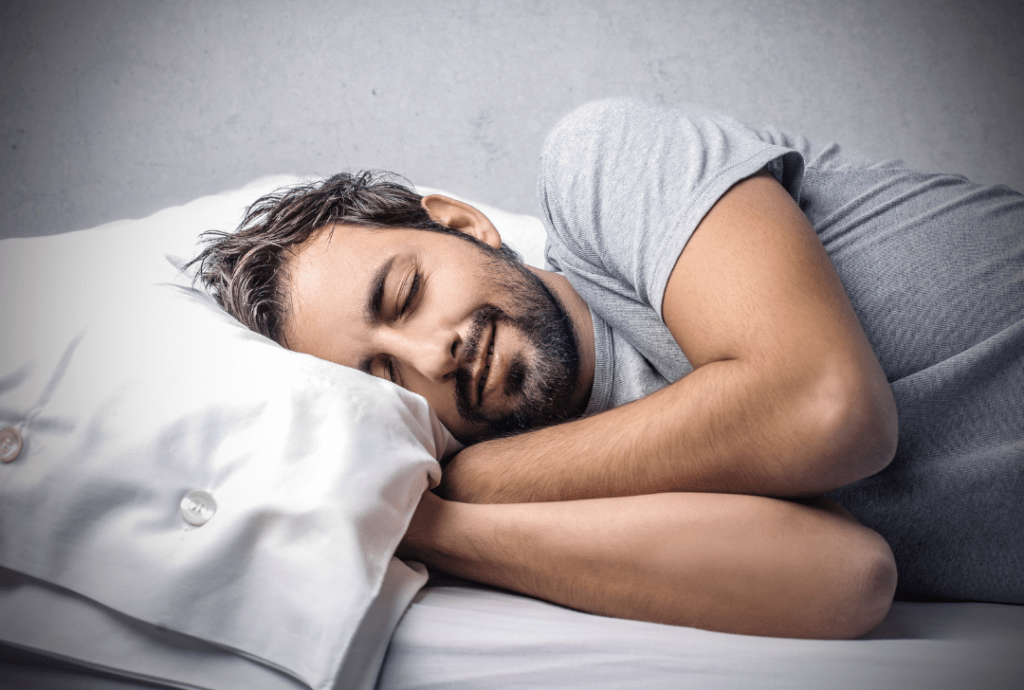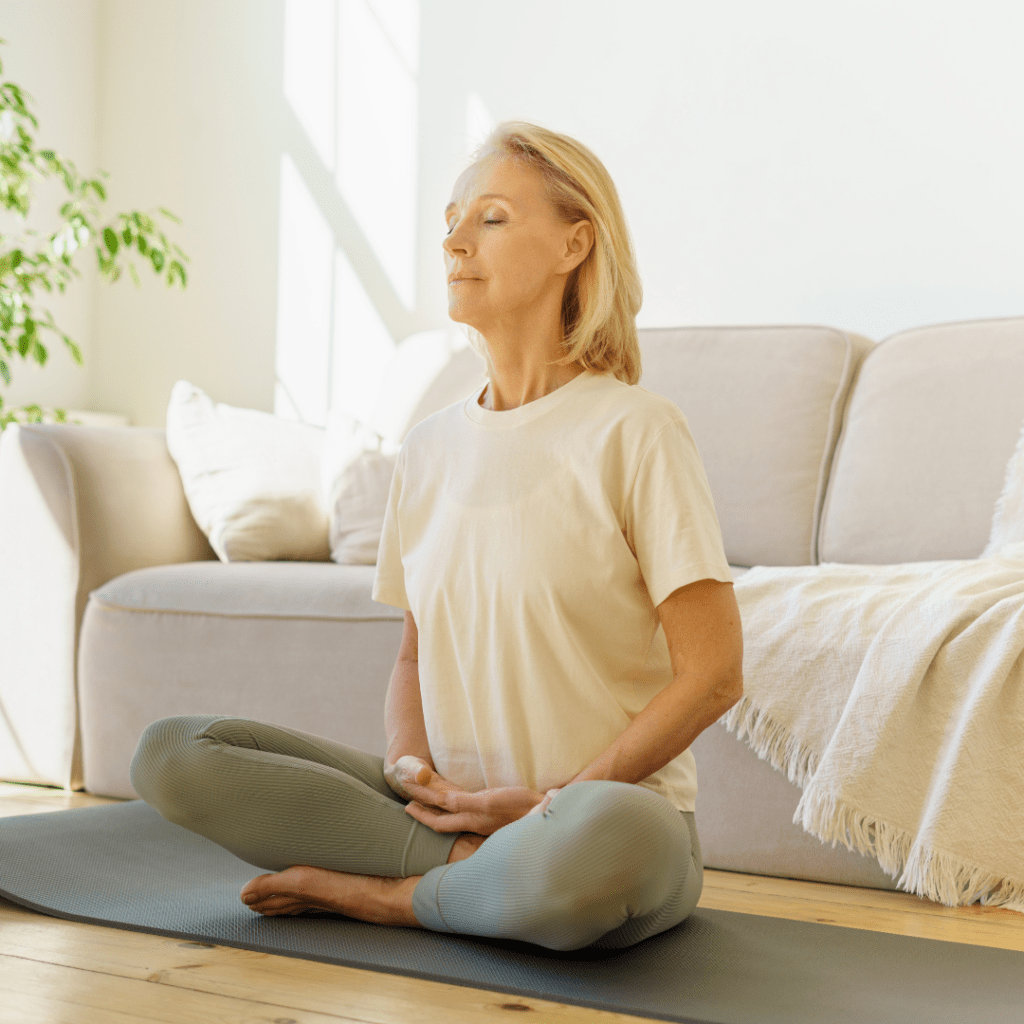How to Reduce Pain, Stress and Get More Sleep without Drugs or Alcohol, it’s a question that many of us ask ourselves. It can feel like an uphill battle when pain and stress keep us up at night. Pain makes sleep elusive, leading to a vicious cycle where lack of sleep intensifies the pain, we’re trying so hard to escape from. We do everything we can to alleviate the pain so we can go to sleep. But that’s a problem, lack of sleep aggravates pain. We’ve all heard about the risks associated with relying on drugs or alcohol for relief. So, let’s explore the fascinating relationship between pain and sleep, as well as some easy strategies and mind-body practices that can help with pain management, stress reduction, and better sleep quality.
Table of Contents
How can I Sleep When I have This Pain?
There is a strong correlation between pain and sleep quality, according to scientific studies. Lack of sleep affects the experience of pain in two different ways. First of all, it reduces pain tolerance, making the same suffering feel worse. Insufficient sleep increases physical sensitivity, just as it can cause emotional irritability. This phenomenon emphasizes how important sleep is to our general well-being.
Sleep Deprivation and Pain Medication

Beyond intensifying pain, sleep deprivation also triggers hyperalgesic changes – a heightened sensitivity to stimuli that typically aren’t painful. This alteration disrupts natural pain-reducing mechanisms, impacting the effectiveness of pain medications, including opioids.
Thus, taking medications to reduce pain in order to get to sleep may not be very effective. You may have experienced it yourself or heard someone report that pain meds didn’t work, and complain, “I was awake all night.” Perhaps it was the lack of sleep that caused the medication failure.
Prioritizing Sleep for Pain Management
Recognizing the intricate relationship between sleep and pain prompts a shift in approach. Rather than focusing solely on pain alleviation, prioritizing healthy sleep becomes essential. Addressing potential underlying sleep disorders, such as sleep apnea or insomnia, can lay the foundation for improved sleep quality and pain management.
Sleep, Insomnia and Your Health
Getting a good night’s sleep is crucial for your overall health. However, many people struggle with sleep problems such as chronic insomnia or have trouble sleeping due to stress hormones or medical conditions. Thankfully, there are ways to improve your sleep quality without resorting to sleeping pills or other drugs.
When I told my doctor that I was teaching classes to overcome insomnia, he said he had many patients experiencing sleep problems and he’d like to refer them to my class, but they would not come. They want a pill, even though the sleep quality may not be as good. I have to admit that for a long time I did not consider sleep loss to be much of a problem. If I didn’t sleep, I didn’t worry about it. “I’ll sleep tomorrow night.” I had no idea how problematic sleep loss can be until I began preparing for these classes. “ – Larry Wells
What’s the Big Deal About Sleep?

There has been a lot of research into the nature, process, purpose and value of quality sleep. There are tons of scientific articles addressing each of these issues.
“Researchers have found connections between sleep and heart disease, high blood pressure, diabetes, depression, poor memory, weight gain—and even shortened lifespan. According to a study published earlier this year by the American College of Cardiology’s Annual Scientific Session Together With the World Congress of Cardiology, getting good sleep could add years to your life.” Amazing!
The study found that young people who have more beneficial sleep habits are incrementally less likely to die early. Moreover, the data suggest that about 8% of deaths from any cause could be attributed to poor sleep patterns.”
Furthermore, what has been discovered is that those who pride themselves on being able to get by with five or six hours of sleep per night are doing themselves a big disfavor. They are shortening their life and laying the groundwork for some major illnesses. Even those who are in bed for eight or nine hours per night but do not sleep well are in danger of experiencing health problems. So, what are we to do?
There are some simple things that can help. Just making these simple changes can make a difference. If sleeping soundly is still elusive, see a sleep specialist. Sleeping medications, prescribed or over the counter, do not address causes and also cover up symptoms. And, they may not provide the benefits of natural sleep.
How to Fall Asleep Naturally without Medication
To ensure adequate sleep and reduce the risk of daytime sleepiness, it’s important to establish a regular sleep schedule. This means going to bed at the same time every night and waking up at the same time each morning. Limit naps during the day as they can interfere with nighttime sleep.
Avoid alcohol before bedtime as it can lead to poor sleep quality. Instead, try relaxation techniques like listening to soothing music or practicing breathing exercises before bed.
Do these Nine Preparatory Steps to Improve Sleep Quality
- Mindfulness Meditation: Engage in mindfulness meditation to calm your mind and reduce stress. Practice deep breathing and focus on the present moment to ease anxiety.
- Limit Stimulants: Avoid stimulating substances like nicotine and excessive caffeine after 3:00 PM or within 7 to 8 hours of bedtime. Caffeine’s stimulatory effects can disrupt the transition into better sleep.
- Establish a Sleep Routine: Set a consistent sleep schedule, which reinforces the body’s internal clock, making it easier to fall asleep and wake up naturally.

4. Regular Exercise: Incorporate regular physical activity into your routine. Exercise releases endorphins, which are natural stress relievers, and can promote better sleep.
5. Create a Relaxing Bedtime Ritual: Wind down before sleep with calming activities such as reading, taking a warm bath, or practicing gentle movement stretches.
6. Limit Screen Time: Reduce exposure to screens (phones, computers, TVs) before bedtime, as the blue light can interfere with your body’s production of melatonin, a sleep-inducing hormone.
7. Optimize Your Sleep Environment: Ensure your bedroom is conducive to sleep by keeping it dark, quiet, and cool. Invest in a comfortable mattress and pillows.
8. Stress Management Techniques: Explore stress management techniques such as journaling, progressive muscle relaxation, or seeking support from a therapist or counselor.
9. Limit Alcohol and Avoid Drugs: While it may seem tempting to use alcohol or drugs as sleep aids, they can disrupt your sleep patterns and lead to dependency. It’s best to find natural alternatives for better sleep.

By incorporating these lifestyle changes into your daily routine, you can reduce stress and enjoy improved sleep quality without the need for drugs or alcohol.
How to Use your Body to Calm your Mind in Less than 5 minutes
Studies suggest leaning more towards natural methods, such as incorporating relaxation techniques into your daily routine, rather than relying solely on medication for achieving adequate sleep.
Creating an environment conducive to quality rest goes beyond establishing an effective bedtime routine.
In fact, shaping spaces that promote better sleep can also help reduce stress levels without resorting to drugs or alcohol.
A simple yet effective technique involves using the body to calm the mind that combines elements of mindfulness, body awareness, and gentle movements to guide you toward profound relaxation in a way that can lead to drowsiness.

- Find a Quiet Space: Begin by locating a peaceful and quiet space where you can comfortably sit or lie down.
- Close Your Eyes: If possible, gently close your eyes to minimize external distractions.
- Breathe Naturally and Gently: Begin your journey to a calmer mind by focusing on your breath. Inhale slowly through your nose, allowing your lungs to fill with fresh air. Then, exhale gently through your mouth, releasing any tension. Observe your natural breathing pattern without attempting to alter it.
- Body Scan: Begin to scan your body from head to toe. Pay close attention to any areas of tension, discomfort, or stress. Identify these areas without judgment.
5. Gentle Movements: With your eyes closed, initiate gentle and slow movements with different parts of your body. These movements should be effortless, smooth, and performed with complete awareness. For example, you might gently turn your head from side to side, roll your shoulders, move your legs or flex your fingers.
6. Mindful Observation: As you perform these movements, focus your attention on the sensations in your body. Notice how each movement feels and be present in the moment. Let go of any racing thoughts or worries.
7. Breath Integration: Continue to synchronize your movements with your breath. Inhale as you initiate a movement, and exhale as you return to a neutral position. This integration promotes a sense of harmony between your body and your breath.

8. Progressive Relaxation: With each movement, allow your body to gradually release any accumulated tension. Feel the relaxation spreading through your muscles and soothing your mind.
9. Final Moments: After a few minutes of these mindful movements, come to a still and relaxed position. Take a moment to bask in the tranquility you’ve created within yourself.
Sounder Sleep Techniques for Better Sleep
If you’re having sleep problems, improving your sleep quality doesn’t always require a prescription for sleeping pills or other forms of sleep medicine. Instead, adopting certain habits and following specific techniques can help you fall asleep faster and enjoy more restful nights. There is a simple process you can practice to use the body to calm the mind in a way that can lead to drowsiness. As you lie in bed, hold one thumb with the other hand. Notice how you are breathing. Do not change it or try to breathe in any particular way. Each time you inhale, very gently but almost imperceptibly squeeze the thumb. So long as you inhale, continue the gentle squeezing. As you exhale, slowly release the squeeze. Squeeze on the inhale and release on the exhale. Allow your natural breath to set the pace. Do not try to breathe deeply or in any particular way.
Individual Solutions
Enhancing sleep quality amidst pain requires a personalized approach. Experiment with different strategies to identify what works best for you. Recognize that achieving better sleep requires trial, error, and adaptability.
Adopting holistic strategies such as the power of Neuro- Linguistic Programming and the Sounder Sleep System™ empowers you to address the root causes of sleep disturbances, break free from the pain-sleep cycle, and have restful nights without turning to medications or alcohol.
Larry Wells has combined his work in NLP with the Sounder Sleep System™ , the program called Better Day, Better Nights might be worth exploring if you’re struggling with sleep-related issues. By acknowledging the correlation between our natural sleep patterns and the ability to relax and return to sleep, you can find comfort and reassurance.
Conclusion
Getting a good night’s sleep is essential for our overall health and well-being. It’s not just a luxury, but a necessity. Lack of quality sleep can lower pain tolerance and make pain experiences more intense. Additionally, stress can disrupt our sleep, but understanding its impact can help us manage it better. If you’re looking for natural ways to reduce pain, manage stress, and improve sleep without relying on drugs or alcohol, we’ve got you covered! At Future Life Now Online, we offer unique online programs designed to equip you with the tools you need to tackle daily anxiety and ensure restful sleep. Ready to start your journey towards healthier living? Click here to learn more and get started today!